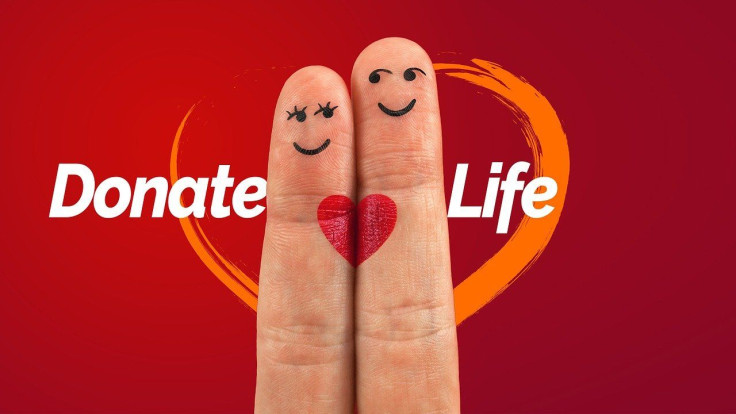National Donor Day 2021: 6 Facts About The Life-Saving Cause
KEY POINTS
- National Donor Day raises awareness about organ, eye and tissue donation
- Some misconceptions tend to keep people from signing up to donate
- Below are some facts about donation that may encourage people to sign up to be a donor
Feb. 14 marks Valentine's Day, but it's also a time to celebrate and raise awareness about one of the most generous acts a person can do: donate a part of themselves.
On National Donor Day, we recognize not only those who gave or received new life through transplant, but also those who died while waiting for a donation.
Whether it's blood, eyes, tissue, platelets, marrow or organs that were donated, there's no question that the act of donating has changed and saved many lives. And if you haven't considered organ donation yet, perhaps National Donor Day is a good time for you to look into how the simple act of agreeing to be a donor can save someone else's life.
Now let's have a look at some organ donation facts that may encourage people to consider being a donor, courtesy of the Health Resources & Services Administration (HRSA), the University of Pittsburgh Medical Center (UPMC) and the Mayo Clinic:
The Transplant Waiting List Grows Everyday
According to HRSA statistics, a name is added to the national transplant waiting list every 9 minutes. As of September 2020, more than 109,000 men, women and children are still on the waiting list for a transplant.
Unfortunately, every day, about 17 people die without getting the life-saving transplant they need. And while a vast majority of Americans are supportive of organ donation, only 60% are actually registered.
Medical Professionals Will Take Good Care Of You
Some may have the concern that first responders or doctors won't take good care of them anymore if they learn that the patient is an organ donor, but that's not true. According to HRSA, health professionals' "one and only priority" is to save the patient's life.
The only time that they consider organ donation is after death has been declared, UPMC noted. In fact, according to Mayo Clinic, people who have agreed to donate their organs are even given more tests to see if they're really dead compared to those who are not donors.
Anyone Can Be A Donor
You may think that you're too old or aren't "healthy" enough to donate, but anyone of any age and medical history can actually be a donor. At the time of death, a transplant team will assess the possible donor's condition and determine if any of the organs are viable for transplant.
In fact, one of the oldest donors in the U.S. was a person aged 92, HRSA noted.
Those younger than 18 years old may also discuss their wish to be a donor with the family since it will be their decision to consent to the organ donation. As Mayo Clinic noted, it's important to remember that there are children who need organs, too, and they tend to need smaller organs.
You Can Save More Lives Than You Might Think
Apart from common organs that people tend to hear about when it comes to organ donation, organs such as the stomach, intestines, skin and lungs can also be donated, UPMC said. In fact, a donor can actually save eight lives if they donate their organs and even up to 75 lives by donating tissues.
And people don't have to worry about how their bodies will be treated because donors' bodies are treated with "care, respect and dignity," HRSA said.
People can even start saving lives through organ donation even before death since people can actually donate their organs while they're still alive. They can become a living donor of organs such as the kidneys and still live a healthy life afterward.
There's A Need For Minority Donation
According to the Mayo Clinic, it's even more important to consider organ donation if you are an ethnic minority as minorities may be more likely to have certain chronic conditions that affect the organs and require a transplant. What's more, there are certain blood types that are more prevalent in minority populations.
"Because matching blood type is usually necessary for transplants, the need for minority donor organs is especially high," the Mayo Clinic said.
There's No Special Treatment In Organ Donation
Although it seems like the rich and famous tend to get their organs faster, perhaps all the publicity around their procedure just makes it seem that way. The truth is that a computer matches the organs with the possible recipient based on information including their blood type, how sick they are and how long they've been on the list.
"Race, income, and celebrity [sic] are NEVER considered," the HRSA said.
Anyone can contribute to the cause by signing up to be a donor, spreading the word, or sharing their stories if they have a personal experience with any donation. Even the simple act of posting about the event on social media may raise awareness about being a donor and those who still need life-saving transplants.

© Copyright IBTimes 2025. All rights reserved.






















